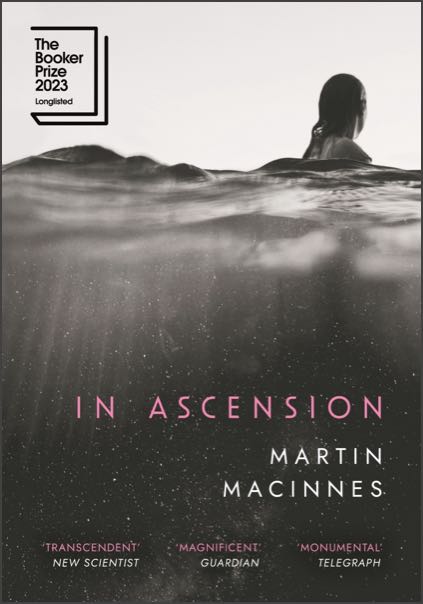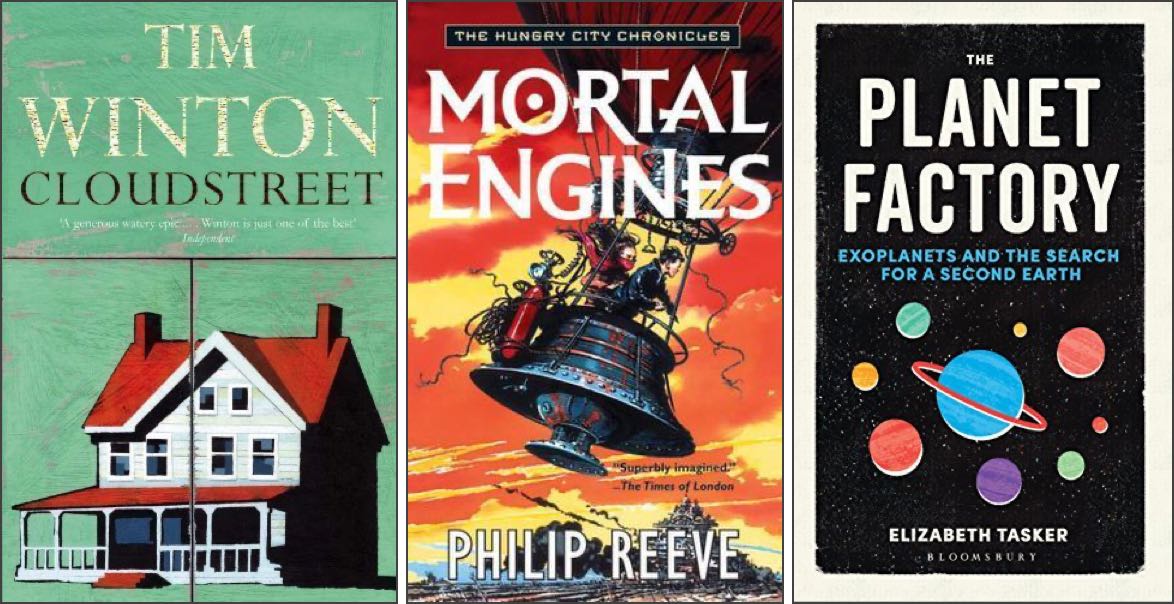
Issue #66: Sunday 26 May, 2024
Because of the serious illness of a close family member, I’ve been greatly stressed and distracted in recent weeks, and so my reading has dropped right off. Nevertheless, I managed to get through two very good books since last issue.

This is one of those rare books that, long as it is, on having completed it I immediately wanted to turn around and start reading it again from the beginning. The distractions I mentioned above meant that just wasn’t feasible, however.
There are many mysteries encountered in the book, and few if any of them are given clear answers; yet that doesn’t matter. The mysteries, the questions which arise, are by themselves deeply thought-provoking and stimulating.
Where to start? The story is told from the first-person point of view of Leigh Hasenbosch, born in the Netherlands. Her mother is a highly-ranked mathematician, her father works as a hydraulic engineer for the regional water board, the Waterschappen. These are the local organisations which work continuously to keep the sea at bay, to prevent the land from disappearing beneath the waves. Water, and the power and mystery of the ocean, are indeed constant themes throughout the book.
And throughout the book but in the background, climate change is wreaking havoc on the Earth: in many regions, heat is becoming unbearable, coastal cities are regularly flooded, and yet many coal-fired power plants continue to generate heavy smog. It’s not a polemic as is Kim Stanley Robinson’s The Ministry for the Future, but just a generalised sense of despair and of bafflement at our inability to do much about it.
Leigh’s fraught relationships with her parents and her younger sister Helena, are a strong thread of narrative through the book. After a difficult childhood during which, Leigh tells us, she was regularly and arbitrarily beaten by her father, she grows up fascinated by water-borne life, particular algae, which becomes the central focus of her scientific researches. She becomes intrigued by the idea of developing the use of algae as a food source.
Early in the book, while still studying for her doctorate, Leigh signs on as a menial helper on board a small expedition ship headed off into mid-Atlantic. She knows little of the purpose of the expedition until they are out at sea. Then she finds out that it’s going out to an area of the ocean which seems to have somehow subsided, carrying a few undersea cables with it. Radar and sonar soundings seem to indicate that this lenticular-shaped region now appears to be many kilometres deeper than it had previously been, almost as deep as the Marianas Trench. The mystery literally deepens as the ship moves over the anomaly. Leigh can only be peripherally involved in the research, but she is fascinated. Eventually, though they lose their remote vehicle in the depths, the team is able to retrieve algae-like biological samples from the abyss. These samples play a key part in what follows.
Without going into too much detail (read the book!), Leigh ultimately becomes part of a another expedition, this time in space, out to the farthest reaches of the solar system, an expedition triggered by what appears to be first contact with alien intelligence.
That brief summary of the plot doesn’t do justice to the wonderful quality of the writing, which at almost every moment makes you pause to think, to digest. Even small things about ordinary life are magnified and examined by the author’s gaze. Here, for example, plucked almost at random from the book, is Leigh pondering the fact that her ex-partner hadn’t been in contact when she knew Leigh was leaving the country:
The small routines I carried with me weren’t noted in their absence by anyone, and I regretted this. I moved from place to place –- across a room, through a doorway, past a table –- and I carried all this with me and it was not acknowledged. Everyone should be acknowledged. Everyone should be missed when they are not right there with you because of what they carry, this very distinct way they have of bearing themselves that is like no one else and that is built by everything they have done and everything they have seen. When that goes – even just a little way, through the doorway, the other side of the wall, even while you can still hear the movement taking place – it should be missed. It should be startling, when we travel, when we are there and then not there. Travelling is a reminder that every thought it is possible to conceive of exists on a material plane and that it is there and then not there and that fact is extraordinary, and unbearable.
In Ascension was long-listed for the 2023 Booker Prize, but didn’t make the short list. Pity, as it’s very good. I’d really like to go back and read it again.

This is a kind-of-sequel to the author’s debut novel, The Dictionary of Lost Words. I say “kind-of” because the protagonist of this one is quite different, though the setting is the same – Oxford University in the Edwardian era and specifically just before and after the Great War – and there are several shared characters between the two books.
The first-person protagonist of The Bookbinder of Jericho is just that – a young woman who works in the binding department of Oxford University Press, located in Jericho College. Her name is Peggy (short for Margaret) Jones, and she is one of a pair of identical twins. Her sister Maud, though identical in appearance to Peggy, is different mentally. Perhaps due to some birth trauma, Maud can only speak simple words or echo the phrases she’s heard spoken by others. She also has limited ability to do complex tasks. Peggy, though loving Maud deeply, sees it as her lifelong responsibility to look after Maud, even at the expense of her own desires and ambitions.
Both Peggy and Maud work at Jericho, folding and assembling printed sheets of books produced by the Press. In her work, Peggy gets frequent glimpses of parts of these academic works, and longs to read more. Occasionally, she can take home damaged parts of these works, and, following on from her mother’s example, has built up a considerable if fragmentary library of her own in their narrowboat tethered in the Oxford canal. Just across the road from Jericho is the entrance to Somerville College, one of the only Oxford Colleges for women at that time. Peggy looks longingly at the entrance, knowing, she thinks, that she will never have the chance to pass its portals.
Then the Great War begins in 1914, and many of the male workers at the Press volunteer to fight. In theory, that should open up opportunities for Peggy, but in practice little changes. It also puts on hold the suffragette movement agitating for votes for women.
However, when Belgian refugees start arriving in Oxford, as well as soldiers badly injured in the fighting, Peggy volunteers to help, and this leads her to make important connections which will end up changing her life forever.
This was an excellent, engaging read which I enjoyed a great deal. The characters, the setting of Oxford, and the mileu are all very well depicted and interesting. A fascinating Author’s Note explains how the story arose from her researches for her first book.
Definitely recommended.

Note: If you’re paying attention, you’ll often find that a book I’ve reported as being part of my current reading in one issue of this newsletter appears to have vanished when I put out the next issue. Generally that’s because it was a library book which I didn’t have time to finish before it had to go back to the library. Then it goes onto my very long “want to read” list.
I’ve been watching far more television than I usually do, again largely because of the illness of a family member which I’ve alluded to. But there’s little of it which I want to discuss here in any detail: it’s mostly been watching easy-to-digest material to fill in gaps in my time and temporarily save me from worrying.
If you’d like to make a modest contribution to my efforts in this newsletter, I’d love it if you would buy me a coffee.
Want to comment? Please send an email to:

© Copyright 2024 by David R. Grigg
and licensed under Creative Commons License CC BY-ND 4.0.